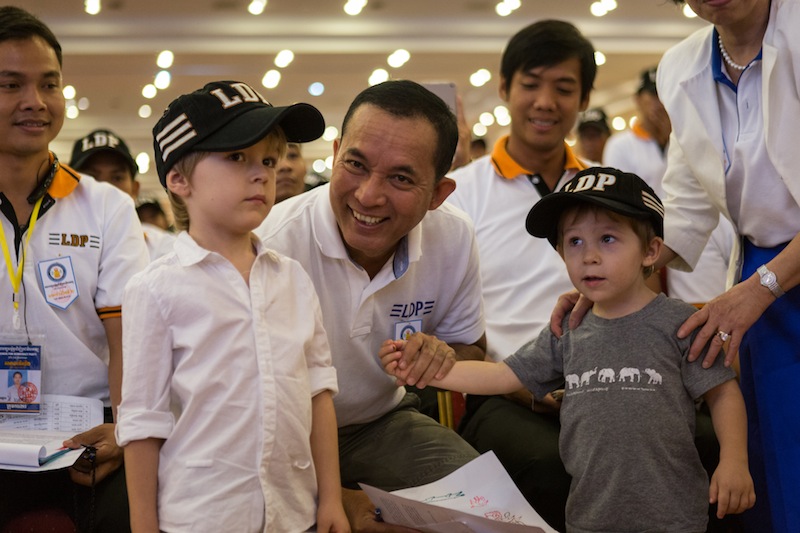The president of the League for Democracy Party (LDP) is facing a legal complaint over public comments he made earlier this year in which he said he “detested” the Khmer race and suggested that he would like to form his own country.
Khem Veasna, the minor party’s leader, was accused of public insult by a Phnom Penh businessman last week over statements Mr. Veasna made during a gathering with LDP supporters in Kompong Speu province in February.

“Mr. Khem Veasna insulted and looked down on the Khmer race, which includes me as a Khmer, by saying ‘The Khmer race is those dishonorable [people] and are dogs, etc.’ as well as a lot of other grotesques words that affect my honor and dignity and the whole Khmer country,” newspaper publisher Soch Soeung, the plaintiff, said, according to the complaint filed to the Phnom Penh Municipal Court on June 12.
In video footage of the February event posted to the League for Democracy Party Facebook page, Mr. Veasna says, “If you think I am valuable, let me have an island and [I] won’t live as your nationality. I ask to not wear the sign of your nationality. I ask to wear the sign of my new nationality and also don’t accept the Khmer nationality.”
“First, the Khmer already has its name. The Khmer country already has its name in the United Nations. Second, I so detest this race, that Khmer race,” he says.
“I am not a Khmer. My country is new and I will bring all older and younger people,” he continues.
“My new country is the League [for Democracy Party] country. Holding our national passport is the League nationality.”
“This race is the League race that originally came from the disreputable country which is the Khmer country,” Mr. Veasna claims.
Kov Kea, LDP spokesman, said on Monday that he was aware of the complaint, but Mr. Veasna had not received a court summons.
“We will wait to see based on the real situation whether our leader needs to go [to court] or a representative like a lawyer can handle this matter,” Mr. Kea said.
Public insult carries a fine of 100,000 to 10 million riel, or about $25 to $2,500.
In an interview with a local Khmer-language media outlet published on Sunday, Interior Ministry spokesman Khieu Sopheak said authorities were “interested” in Mr. Veasna’s statements.
“We are so hurt with the words that insult the Khmer race,” General Sopheak said.
“[He] asked to live on an island and that is secession. Secession of the Khmer people is against the constitution.”
Mr. Veasna could not be reached on Monday, but a post on the party’s Facebook page on Sunday aimed to clarify that Mr. Veasna had no intention to secede from the nation.
According to the post, Mr. Veasna had said at the February event that the nation’s constitution did not allow the state’s territory to be divided.
“This means that Mr. Khem Veasna acknowledged the constitution and wanted to clarify to the party’s supporters that we cannot break the country in two or create a secession,” the post says.
Earlier this month, the National Election Committee issued a warning addressed to Mr. Veasna for allegedly violating election law by criticizing other parties online during the commune election’s campaign blackout period 24 hours before polls opened on June 4.
Mr. Soeung, who filed the complaint against Mr. Veasna, said on Monday that the party president’s insulting rhetoric had motivated him to take the issue to court.
“I cannot bear his insulting and I filed this complaint not to serve any political movement or tendency of any party,” he said.
“It started from my own heart and will.”
Mr. Soeung said he received a summons on Monday to appear in court on Friday.
Court spokesman Ly Sophana could not be reached on Monday.
Cham Bunthet, a political analyst and adviser to the opposition Grassroots Democracy Party, said Mr. Veasna’s rhetoric was difficult to interpret but his approach did not benefit politics or the country.
“It’s hard to understand him,” Mr. Bunthet said.
Being able to accept criticism and political differences were among the pillars of democracy, he added.
“But this group do not. If you criticize them, they blast you,” Mr. Bunthet said.
“If you say something that is different from them they insult you. They curse you. It’s scary.”
(Additional reporting by Matt Surrusco)



